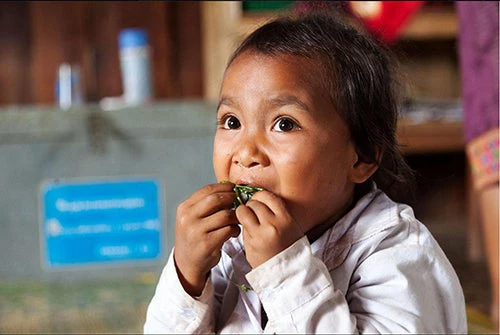
It seems so obvious. Without laying the foundation for healthy growth and cognitive development of children from the start, how can we expect that nations and their economies will grow and thrive? With the strong evidence of often irreversible damage caused by undernutrition in the early years to later life achievements in school, the ability to produce work, and a link to overweight, obesity and non-communicable diseases, how can the nutrition and health of mothers and children be anything but a top priority for governments and development partners?
Fortunately, for many, it is. Later today at the World Bank/IMF Annual Meetings, an illustrious line-up of champions for the health of mothers and their young children -- often the most vulnerable members of societies around the world – will share their governments’ perspectives on the critical importance of investing in the first years of life. Hosted by the World Bank, the high-level forum, What will it take to achieve both – healthy children and healthy economies? , will showcase the leadership of six countries (Indonesia, Yemen, Ethiopia, Nigeria, Nepal and Afghanistan) that have placed the health and nutrition of women and children at the heart of their nations’ development strategies.
We will hear how they have prioritized investments in family planning and community-based health services; strengthened health systems, targeting pregnant women and children in the first 1,000 days; and achieved improved nutrition and health outcomes through investments and action in multiple sectors.
We know from the recent Lancet series on nutrition (2013) that there is now strong evidence that insuring the health and nutrition of adolescent girls prior to the start of childbearing is another critical point for intervention and investment to assure the healthy beginning of the next generation. The fact that the champions of such early interventions are the Ministers of Finance and Economic Planning and Development sends a particularly strong message. The wealth of nations rests fundamentally on the health of its mothers and youngest children.
So, what can we expect in the way of returns to these investments? The economic case is clear.
Improved nutrition and health contributes to economic growth through better educational attainment; increased adult productivity with fewer work days lost to illness; and increases in savings and wealth from increased life expectancy and reduced health care costs. We know that for every US$ 1 invested in nutrition, as much as $138 in better health and increased productivity can be generated. The right nutrition during the first 1,000 days -- from pregnancy to a child’s second birthday -- can increase a country’s GDP by at least 2-3% annually. Every US $1 spent on family planning can yield an estimated US$ 1.40 in savings on maternal and newborn health care, and another US$ 4 saved by preventing complications of unintended pregnancies. And a 10% increase in life expectancy is associated with economic growth increases of 0.3-0.4% per year.
How can we support the champions participating in today’s Bank forum? Through IDA, the World Bank Group’s fund for the poorest, we will continue to help countries as they work to improve the health and nutrition outcomes for the most vulnerable in their societies. During the last decade, IDA funding immunized nearly 600 million children, helped 117 million people to receive health services and provided access to better water sources for 123 million people. Certainly there is a long distance to go, but today’s event underscores the determination and potential for real progress.
Follow the World Bank’s health team on Twitter: @worldbankhealth.
Related
World Bank Live: What Will It Take to Achieve Healthy Children and Healthy Economies?
World Bank and Health
Press Release: World Bank Group to Invest $700M to Improve Women and Children’s Health


Join the Conversation